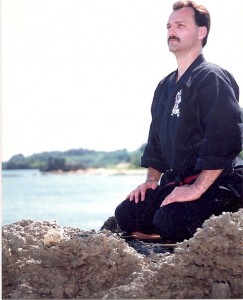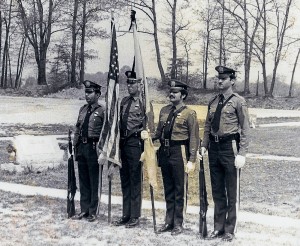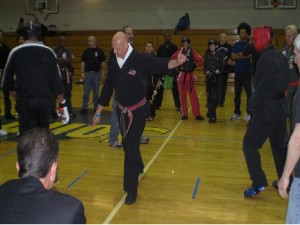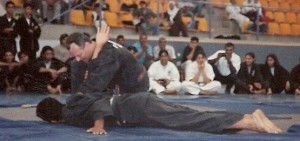“Secrets of the Masters” – Clear Vision
“The knife cuts but it cannot cut itself; the eye sees, but it cannot see itself.”
As our individual lives unfold we begin to amass a volume of knowledge. This is a combination of “Firsthand Knowledge” along with much “Secondhand Knowledge”. I personally define “firsthand knowledge” as information that we assimilate and process further through personal experience. This is the “been there, done that” type of information that weighs heavily on our overall concept of life.
In contrast, I define “secondhand knowledge” as information we glean from other sources. Those sources begin with our family (mother, father, siblings, etc.) and then friends, associates, and later, teachers/mentors (in a more formal way). Less direct sources may include written, audio, or video material. In my opinion, it is extremely important to accurately and critically identify the source of all secondhand knowledge when weighing its credibility.
When weighing the credibility of firsthand knowledge we each have a greater tendency to give this information automatic credibility. This may well occur because our perspective of life is established on the basis of what is seen through the lens of our own eyes, not through the eyes of others. It is critical to remember that the validity of the conclusions drawn from processing any information is a function of the original and underlying premise or premises. (more…)
Forze dell’Ordine e Arti Marziali – Il miglior rapporto ? – Parte 2
Questa e’ la PARTE 2 della serie di articoli intitolati “Forze Dell’Ordine e Arti Marziali – Il Miglior Rapporto?”. Aggiornerò l’articolo con una nuova sezione ogni lunedì. (Vi prego di scusarmi per il ritardo di questo post a causa di problemi tecnici)
Ostacoli all’allenamento che viene fondato sulle “Migliori Pratiche”
Dopo aver identificato alcune delle sfide, nel ricevere la formazione di base delle Tecniche Difensive all’Accademia, diventa ancor più importante per i rappresentanti dell’ordine che la formazione iniziale ricevuta sia efficiente, efficace e pratica. Ci sono una quantità di ostacoli che di solito si incontrano sulla strada che porta a raggiungere questi semplici requisiti.
Per primo, la “formazione delle TD di base” che esiste nelle Forze dell’ordine varia significatamente da accademia a accademia e anche da istruttore a istruttore a seconda della scuola. E ‘giusto riconoscere che ci sono alcuni programmi di allenamento, di qualità decisamente elevata nei programmi di formazione del FO/TD, nonostante molti ostacoli. Questo articolo non è da intendersi come un atto di accusa contro l’attuale status quo, ma come un dibattito equo destinato ad ispirare cambiamenti positivi a beneficio dei nostri professionisti delle FO e ad aiutarli nel lavorare in sicurezza. (more…)
Law Enforcement and Martial Arts – the “Best” Connection? – Part 2
This is PART 2 of a 3 part series titled: “Law Enforcement and Martial Arts – the ‘Best Connection’?” A new section adding to this article will be posted each Monday. (Please excuse the delay of this post due to technical difficulties)
Obstacles to “Best Practices” based training
After identifying some of the challenges for officers to even receive DT training beyond the academy basics, it becomes more significant that the initial training received is efficient, effective, and practical. There are number of obstacles that commonly stand in the way of accomplishing these simple requirements.
First, the “basic DT training” that exists in LE today varies significantly from academy to academy and sometimes even from instructor to instructor within a particular academy. It is only fair to acknowledge that there are some remarkably high quality LE/DT training programs in spite of many obstacles. This article is not intended as an indictment against the present status quo but as a fair discussion intended to inspire positive changes to benefit our LE professionals and help keep them safer. (more…)
“Sono stato fregato!!!…” – Il Resto Della Storia!
Dopo molti anni senza contatti, ho recentemente mandato alcune vecchie foto a un mio amico delle Arti Marziali, gliel’ho spedite sulla pagina del suo social network. Nelle foto lui era sul ring durante un torneo organizzato da me, e stava gareggiando contro un mio studente Cintura Nera.
La foto era di circa 25 anni fa e mi aveva riportato alla mente la rivalità sportiva che esisteva tra i due eccellenti atleti quando erano così giovani.
Il mio amico mi ha risposto gentilmente e abbiamo condiviso brevemente questo in chat in un modo molto positivo. Mi è sembrata come una ventata di aria fresca il potere interagire con una persona così intelligente e realizzata.
Avevo saputo da altre persone che si era ben realizzato nella sua professione aldilà delle Arti Marziali, io già sapevo, avendo avuto modo di osservarlo molte volte quando era giovane, che era un atleta di grande talento con eccellenti capacità e anche un ragazzo molto spiritoso. Ed è stato incoraggiante vedere che aveva mantenuto un allenamento regolare e dedito all’attività delle Arti Marziali.
Il giorno dopo ho cominciato a ricevere notifiche nella sezione “commenti”del web site del social network dove avevo mandato la foto. Sono stato molto rattristato e deluso da quello che ho letto, dalle parole scritte dal mio amico e da alcuni suoi ammiratori. I commenti erano abbastanza negativi; e dato che questi mi coinvolgono, mi sento motivato a prendermi del tempo qui per affrontare alcune questioni molto rilevanti che lui ha riportato alla luce. (more…)
“I got ripped off!!!….” – The Rest of the Story!
After many years with no contact I recently sent a few old photos to a martial arts friend, posting them on his social network page. They were of him in the ring, in a tournament organized by me, where he was in a match against one of my
Black Belt students. The photo was about 25 years old and to me it brought back memories of the ongoing sports rivalry that existed between those two excellent athletes when they were both much younger.
My friend responded graciously and we shared a brief chat online chat with some very positive interaction. It seemed like a breath of fresh air to interact with such an intelligent and accomplished individual.
I knew from other sources that he was quite accomplished in his professional life outside the martial arts. I also knew from observing him so many times in his youth that he was an extremely talented athlete with excellent skills and was a very spirited young man. It was even more encouraging to see that he had kept up with his regular and dedicated martial arts training and activities.
The following day I began receiving notifications from the social website of “comments” added to the photos I had sent. I was quite saddened and disappointed with what I read, by what had been written by him and some of his admirers. The comments were quite negative, quite involved, so I felt motivated to take the time here and address some very relevant issues that he had brought to light.
Law Enforcement and Martial Arts – the “Best” Connection? – Part 1
This is PART 1 of a 3 part series titled: “Law Enforcement and Martial Arts – the ‘Best Connection’?” A new section adding to this article will be posted each Monday.
Here are some relevant questions facing Law Enforcement officers, administrators, and trainers today concerning Defensive Tactics training:
Is there a “natural” fit between Law Enforcements (LE) and the Martial Arts (MA)?
What is the “best” Martial Arts system to learn for Law Enforcement?
Do our police agencies have the “Best of the Best” with regard for Defensive Tactics (DT) training for their personnel?
What are some realistic and practical expectations for improving the present LE/DT training?
Forze dell’Ordine e Arti Marziali – Il miglior rapporto? – Parte 1
Questa e’ la PARTE 1 della serie di articoli intitolati “Forze Dell’Ordine e Arti Marziali – Il Miglior Rapporto?”. Aggiornerò l’articolo con una nuova sezione ogni lunedì.
Ci sono alcune questioni rilevanti da affrontare per gli ufficiali delle Forze dell’Ordine, gli amministratori e gli
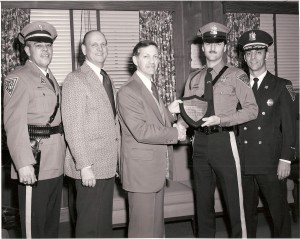
Shihan Pascetta sta ricevendo l'Onorificenza come migliore Poliziotto dal'Accademia della Polizia di Stato del New Jersey - Sea Girt, NJ 1975
addestratori di oggi riguardo all’allenamento delle Tattiche Difensive:
C’è una “naturale” corrispondenza tra le Forze dell’Ordine (FO) e le Arti Marziali (AM)?
Qual’è lo stile “migliore” di Arte Marziale da imparare per le Forze dell’Ordine?
Le nostre forze di polizia hanno il “Meglio del Meglio” per quanto riguarda le Tattiche Difensive (TD) per la loro formazione personale?
Quali sono le reali e concrete aspettative per migliorare l’attuale addestramento delle FO/TD ? (more…)
Martial Arts “Masters” – FACT or FANTASY? – Part 6
This is “Part 6” and the final section in the series of articles titled “Martial Arts ‘Masters’ – FACT of FANTASY?”. I hope that this series has served to educate and stimulate. Please feel free to add your comments or your own personal conclusions either at the end of this post or on our “Comment” page.
MORE “REAL TIME” CONSIDERATIONS
In further considering the differences between “Full time” Masters and “Part time” Masters it is only fair to acknowledge that there are other factors that can also weigh in favor the credibility of the “Part timer”. Specifically, one pertinent and mitigating factor may well be the type of full time work that a particular Master does in addition to his “Part time” activity teaching Martial Arts.
There are examples of Part time Masters who’s “other” employment parallels and/or supplements their Martial Arts activity. Several examples where this may make a difference might include a full time career Law Enforcement Officer or a full time Career Soldier.
Arti Marziali “Masters” – FATTI o FANTASIA? – Parte 6
Questa è la “Parte 6” e la sezione finale della serie di articoli titolati “Arti Marziali ‘Maestri’ – FATTO o FANTASIA?”. Spero vi sia servita da insegnamento e da stimolo. Vi prego di lasciare liberamente i vostri commenti e le vostre personali conclusioni sia alla fine di questo post o sulla pagina dei “Commenti”.
MAGGIORI CONSIDERAZIONI NELLA “VITA REALE”
Di seguito verranno considerate le differenze tra Maestri a “tempo pieno” e Maestri a “part time”. E’giusto riconoscere che ci sono altri fattori che possono pesare a favore della credibilità del “tempo parziale”. In particolare, un fattore pertinente e attenuante può ben essere il tipo di lavoro a tempo pieno che un Maestro fa in aggiunta al part-time dedicato all’attività didattica nelle Arti Marziali
Ci sono esempi di Maestri part time che hanno un occupazione che è integrata parallelamente con la loro attività nelle arti marziali. Parecchi casi in cui questo può fare la differenza, possono per esempio, includere una carriera a tempo pieno come Poliziotto o una come Militare. (more…)
“I Segreti dei Maestri” – Cercare vs. Trovare
“…Quando qualcuno cerca accade facilmente che il suo occhio perda la capacità di vedere ogni altra cosa,
fuori di quella che cerca, e che egli non riesca a trovare nulla, non possa assorbir nulla, in se, perché pensa sempre unicamente a ciò che cerca, perché ha uno scopo, perché è posseduto dal suo scopo.
Cercare significa: avere uno scopo. Ma trovare significa: essere libero, restare aperto, non aver scopo..”
-Siddhartha
Nella citazione del famoso filosofo, Siddartha, il contrasto tra “cercare” e “trovare” sembra voler significare che il primo, in qualche maniera, annulla il secondo.
Io stesso nella vita sono stato ispirato a fare una ricerca per “cercare la verità”. Seguendo la logica di Siddartha, comunque, sono giunto alla conclusione: sarò mai in grado di trovare nessuna verità semplicemente perché sono concentrato a raggiungerla come uno scopo? (more…)
